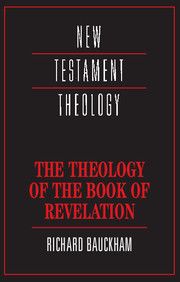Book contents
- Frontmatter
- Dedication
- Contents
- Editor's preface
- List of abbreviations
- 1 Reading the Book of Revelation
- 2 The One who is and who was and who is to come
- 3 The Lamb on the throne
- 4 The victory of the Lamb and his followers
- 5 The Spirit of prophecy
- 6 The New Jerusalem
- 7 Revelation for today
- Further reading
- Index
5 - The Spirit of prophecy
Published online by Cambridge University Press: 05 November 2014
- Frontmatter
- Dedication
- Contents
- Editor's preface
- List of abbreviations
- 1 Reading the Book of Revelation
- 2 The One who is and who was and who is to come
- 3 The Lamb on the throne
- 4 The victory of the Lamb and his followers
- 5 The Spirit of prophecy
- 6 The New Jerusalem
- 7 Revelation for today
- Further reading
- Index
Summary
STATISTICS
Compared with references to God and Christ, references to the Spirit in Revelation are comparatively few. But it would be a mistake to conclude that in the theology of Revelation the Spirit is unimportant. As we shall see, the Spirit plays an essential role in the divine activity of establishing God's kingdom in the world.
More important than the comparative rarity of references to the Spirit is the fact that they fall into numerical patterns comparable with those we have seen to have theological significance in relation to Revelation's terms for God and Christ. References to the Spirit fall into two major categories: those which refer to ‘the seven Spirits’ and those which refer to ‘the Spirit’. The ‘seven Spirits’ are peculiar to Revelation's symbolic universe. There are four references to them (1:4; 3: i; 4:5; 5:6). Four, as we have previously noticed, is the number of the world, as seven is the number of completeness. The seven Spirits are the fulness of God's power ‘sent out into all the earth’ (5:6). The four references to the seven fold Spirit correspond to the seven occurrences of the fourfold phrase which designates all the peoples of the earth (5:9; 7:9; 10:11; 11:9; 13:7; 14:6; 17:15). They also correspond to the 28 (7 ' 4) references to the Lamb, which, as we noted in our last chapter, indicate the worldwide scope of the Lamb's complete victory. The seven Spirits are closely associated with the victorious Lamb (5:6): the four references to them indicate that the Lamb's victory is implemented throughout the world by the fulness of divine power.
- Type
- Chapter
- Information
- The Theology of the Book of Revelation , pp. 109 - 125Publisher: Cambridge University PressPrint publication year: 1993
- 1
- Cited by



